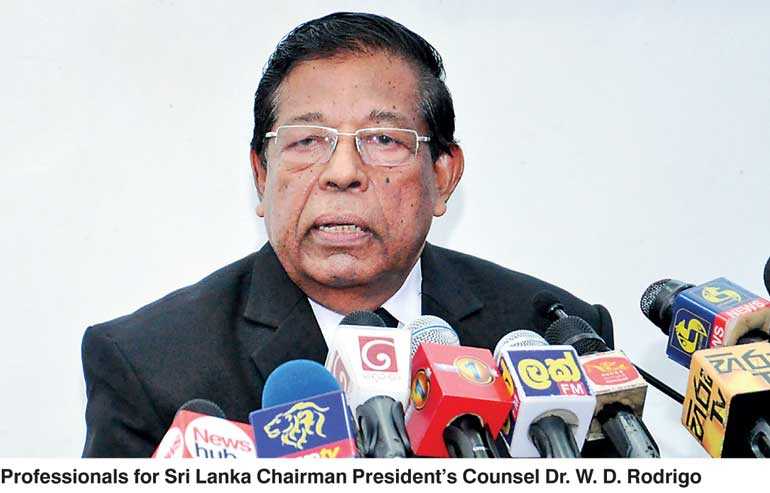Saturday Feb 21, 2026
Saturday Feb 21, 2026
Thursday, 15 November 2018 00:47 - - {{hitsCtrl.values.hits}}

By Charumini de Silva
As sovereignty remains with the people, Professionals for Sri Lanka yesterday pointed out that if the current political instability could not be solved through the Parliament, the Executive President had all the powers to present it to the people at a referendum.
Noting that the root cause for all the current political instability was due to the ‘hybrid’ Constitution of Sri Lanka – which includes a mix of models from the US, France and the UK – Professionals for Sri Lanka Chairman President’s Counsel Dr. W. D. Rodrigo suggested that to avoid such political unrest, the people should be given the opportunity via a referendum to revert to a fully-fledged executive presidential system if they choose.
“Prior to the 19th Amendment to the Constitution, the President had the power under Article 85 of the Constitution to bypass the Parliament and enforce law. Although the 19th Amendment was repealed, that particular Article – Article 86 of the Constitution – is there, which enables the President to submit matters that are, in his opinion, of national importance to the people via a referendum. Even this present issue is a matter of national importance. If it is not sorted out through Parliament, the President has all the powers to present it to the people at a referendum,” he added.
Dr. Rodrigo also stressed that if the President decided to present it to the people, it would be a democratic move which could not be challenged by anyone.
“According to Article 86 of the Constitution, the President may, subject to the provisions of Article 85, submit to the people by referendum any matter which, in the opinion of the President, is of national importance. If he feels there is a question worth presenting to the people, he can do so,” he added.
In addition, he said that under Article 42 (4), the President had the power to appoint as the prime minister a person who, in his opinion, had the confidence of the Parliament.
“The word used here is ‘opinion’, which is a subjective judgement. Therefore it is not based on any objective criteria,” Dr. Rodrigo said.
Emphasising that the Constitution was the basic law of the country, from where every law emanates, he said it was the Constitution that should be supreme, not the Parliament.
He believes that to preserve the unitary state of Sri Lanka, the powers of the Executive should not be reduced.
According to Dr. Rodrigo, 13A has a major effect on devolution within a unitary state.
Pic by Sameera Wijesinghe